Horse Teeth is a very essential and vital part of the horse body. The teeth play an important role because the horse is a grazing animal. Your horse teeth are of different form and shape which needs a routine checkup and dental care. In my article, I have to give you a short description that enhances your knowledge of horse teeth. The horse has a unique dental structure, so it is more important to know the different teeth information.
The Necessity of Learning of Horse Teeth
Learn about the number of teeth, types of teeth, and different forms of teeth information which is the primary steps of learning. When you know the normal anatomy of its teeth structure, then you have to identify the strange dental problems. You have to need proper dental care and periodic routine examination during the foaling stage which may prevent dental problems. Abnormal teeth formation may cause eating problems for your horse.
The Eruption of Teeth
As with human babies, the eruption of teeth in young horses may cause transitory trouble. Temporary teeth may sometimes be lost prematurely, leaving a depression in the gum surrounded by an inflamed margin. This may cause temporary difficulty with eating. Temporary teeth may not fall out but may form a cap on top of the permanent teeth. Veterinarians will remove these as a matter of routine, as they may cause problems. Incisor caps may be present in 2 to 5 years old horses.
Types of Horse Teeth
Your Horse Teeth is a significant part of its body. The horse is a grazing animal that’s why they are dependent upon their teeth for chewing and grinding of food. Your horses have-
- Premolars and molars teeth are also known as cheek teeth or jaw teeth.
- Incisor teeth for grasping grass.
- Canine teeth for cutting.
- Wolf’s teeth are unique to horses.
The Function of Different Horse Teeth
Teeth functions are different which is essential to know for you. The incisor teeth are primarily used to cutting food especially grass when your horse is grazing. Incisor teeth are also used in horse attacks or defense against predators. The premolars and molar’s teeth are used in chew food bitten off by incisors, before swallowing.
Number of Teeth of a Horse
A mature horse hopefully five years of age will have between 36 and 44 teeth. An adult male horse has 40 permanent teeth, and a mare have between 36-40 teeth. Your young horse has 24 deciduous or milk teeth, 12 incisors, and 12 premolars or grinders teeth. They also have canine teeth and wolf teeth. The standard dental formula of an adult horse is as follows:
| Incisor | Canine | Pre-Molar | Molar |
| 3 | 1 | 3 or 4 | 3 |
Examination of Teeth of Your Horse
The Teeth of a Horse should be examined at least once every 12 months if it is grazing. Horses that are stabled or fed concentrates should have their teeth checked every six months. Young horses will need more frequent inspections. You must have to require a systematic approach which is vital for an equine dental examination. This approach depends on:
- Evaluation of oral soft tissue.
- Evaluation of periodontal tissue.
- Evaluation of Occlusion
- Extraoral examination
- The endocrine structure evaluation.
This systematic approach to oral examination minimizes the pathological problems of your horse and helps the veterinarian to give you an appropriate treatment plan for your horse.
Signs of Dental Diseases of Horse
There are different types of signs of dental diseases. Your horse needs proper dental care; otherwise, teeth may become damaged. The animal feels discomfort and pain and falls into other abnormal dental problems.
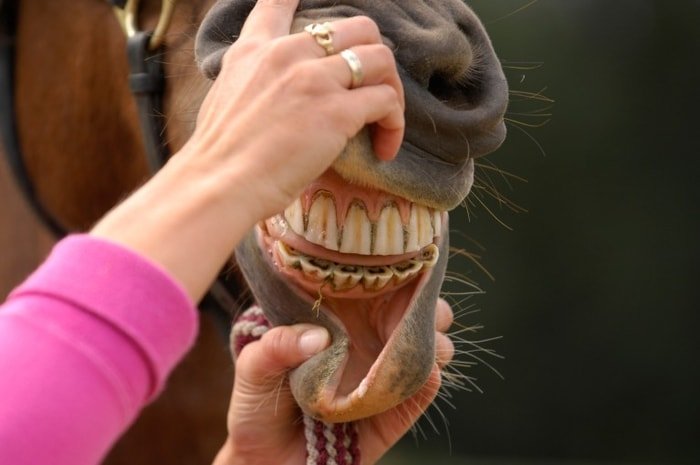 These signs are:
These signs are:
- Excessive salivation.
- Unresponsiveness to the bit of head tossing.
- Affect the rate of chewing.
- Inflammation and ulceration of the gum.Bad smell of breath and painful mouth.
7 Common Horse Teeth Problems
Horse dental problems are a severe condition for horse owners. In an extreme situation, you have to need veterinary help because dental problems can cause constant pain and irritate the animal. Some common equine dental issues are:
1. Sharp Cheek Teeth in Horses
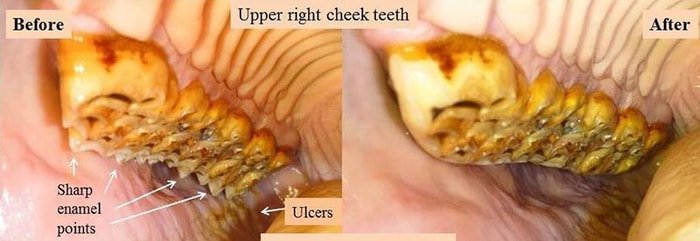 Sharp cheek teeth are the most common problem encountered. The horse’s upper jaw is 30 percent wider from side to side than the lower jaw. The upper molars are also 50 percent wider than the bottom molars. A horse’s teeth grow throughout life, and if wear is uneven, sharp edges and hooks will occur. As a result, the bottom jaw being narrower and develop sharp edges which can cut the cheek and tongue.
Sharp cheek teeth are the most common problem encountered. The horse’s upper jaw is 30 percent wider from side to side than the lower jaw. The upper molars are also 50 percent wider than the bottom molars. A horse’s teeth grow throughout life, and if wear is uneven, sharp edges and hooks will occur. As a result, the bottom jaw being narrower and develop sharp edges which can cut the cheek and tongue.
2. Shear Mouth in Horses
An extreme form of sharp cheek teeth occurs when the difference in width between the upper and lower jaws is much more significant than usual. This is known as “Shear mouth” because the abnormally sharp teeth resemble shearing blades. This condition occurs most commonly in old horses.
3. Wave Mouth in Horses
The molar teeth become wave-like due to uneven wear, the most prominent crest and trough occurring at the fourth molar. The teeth are worn to gum level in some cases, permitting the opposing teeth to cut into the gum and result in infection of the bone.
4. Step Mouth in Horses
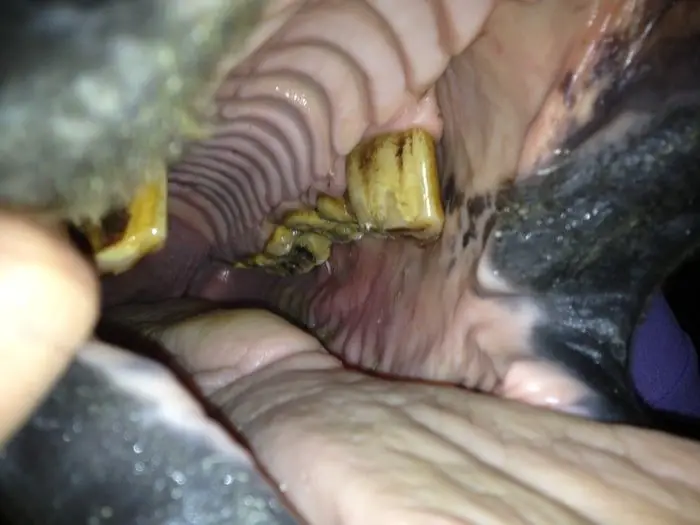 In this condition, neighboring molars vary in length. This may be caused by the loss of an opposing tooth and hence lack of wear. It may also result from the abnormal softness of an opposing tooth. Whatever the cause, the excessively long tooth may make chewing impossible.
In this condition, neighboring molars vary in length. This may be caused by the loss of an opposing tooth and hence lack of wear. It may also result from the abnormal softness of an opposing tooth. Whatever the cause, the excessively long tooth may make chewing impossible.
5. Smooth Mouth in Horses
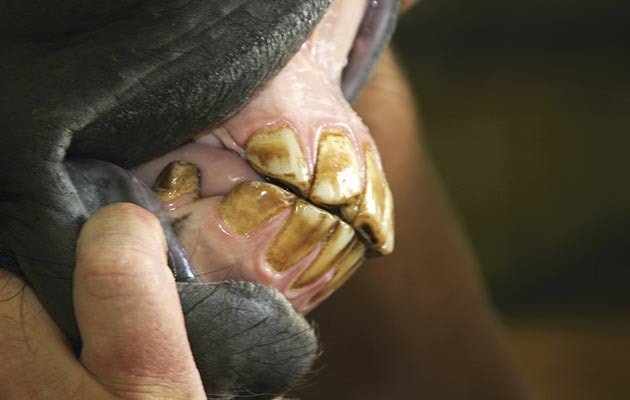
Molar teeth usually have a rough grinding surface. This roughness is maintained throughout life because the denature of the tooth wears faster than the enamel. In some cases, enamel and denture wear at the same rate, resulting in a smooth grinding surface. This is seen mostly in young horses.
6. Imperfect Meeting of Teeth in Horses
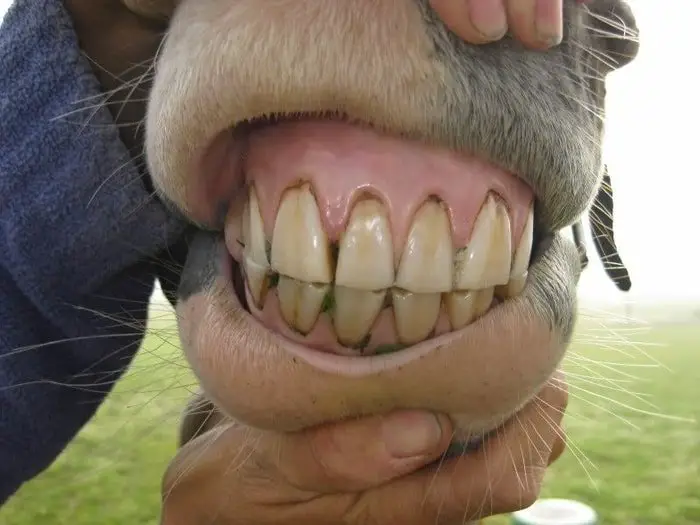 “Parrot mouth,” where the upper jaw overhangs the lower jaw, results in the imperfect meeting of the upper and lower front teeth. It is important to realize that a few horses will have perfect apposition of the front teeth. Parrot mouth is a gross and unmistakable abnormality. “Sow mouth” is different from parrot mouth, and occurs when the lower jaw is longer than the upper jaw. It is not common. A foal that is severely affected may not be able to suck.
“Parrot mouth,” where the upper jaw overhangs the lower jaw, results in the imperfect meeting of the upper and lower front teeth. It is important to realize that a few horses will have perfect apposition of the front teeth. Parrot mouth is a gross and unmistakable abnormality. “Sow mouth” is different from parrot mouth, and occurs when the lower jaw is longer than the upper jaw. It is not common. A foal that is severely affected may not be able to suck.
7. Abnormal Number of Horse Teeth
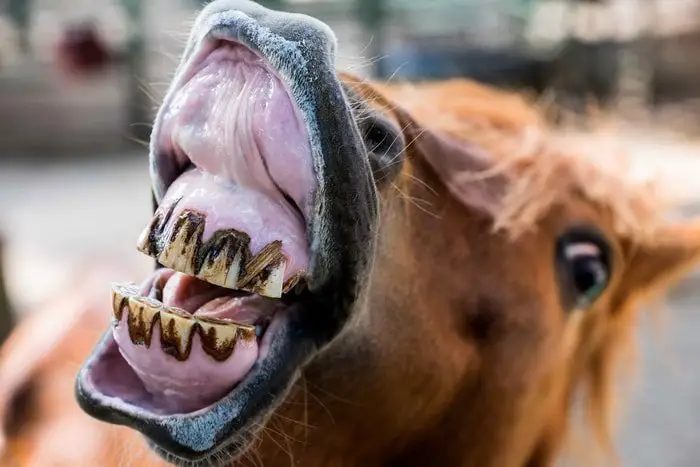 Extra teeth are occasionally found. Their removal is not recommended unless they interfere with chewing or are irritated by the bit. However, the crowding caused by extra teeth may cause a tooth to grow in an abnormal direction, injuries the soft tissues. The wolf teeth are not new teeth. Some other critical teething problems are:
Extra teeth are occasionally found. Their removal is not recommended unless they interfere with chewing or are irritated by the bit. However, the crowding caused by extra teeth may cause a tooth to grow in an abnormal direction, injuries the soft tissues. The wolf teeth are not new teeth. Some other critical teething problems are:
- Broken teeth.
- Decayed teeth.
- Crib-biting or windsucking.
How To Take Care of Horse Teeth
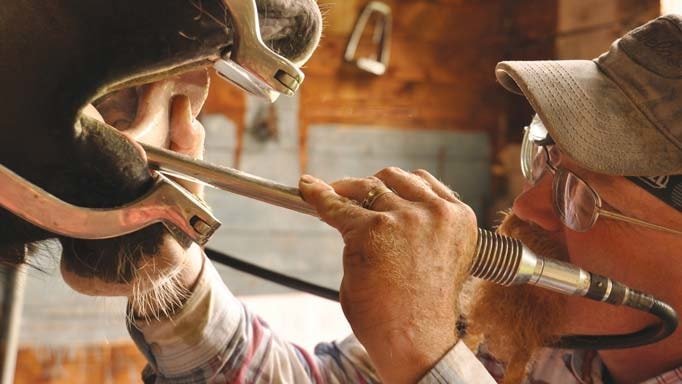 Routine dental care is crucial for your Horse’s health. Proper dental care, examination, and regular maintenance are essential to remove the teething problems. The dental exam should be done when your horse is a newborn foal. Your veterinarian or dentist should have to perform a routine examination of your equine teeth. When your horse becomes older to change its teeth’ shape and angle and in that time your horse faces some problems. So it is vital a schedule regular dental care for your all-aged horses.
Routine dental care is crucial for your Horse’s health. Proper dental care, examination, and regular maintenance are essential to remove the teething problems. The dental exam should be done when your horse is a newborn foal. Your veterinarian or dentist should have to perform a routine examination of your equine teeth. When your horse becomes older to change its teeth’ shape and angle and in that time your horse faces some problems. So it is vital a schedule regular dental care for your all-aged horses.
Concluding Remarks on Equine Teeth
Horse dental issues are a critical topic of horse body parts. The horse is a grazing animal, and throughout its life, your horse will need to have their teeth. Hopefully, I have to explain smoothly in horse teeth structure, some horse teeth, eruption of teeth, horse teeth problems, and horse teeth care. It is essential to improve your knowledge of horse teeth for preventing different types of teething problems.